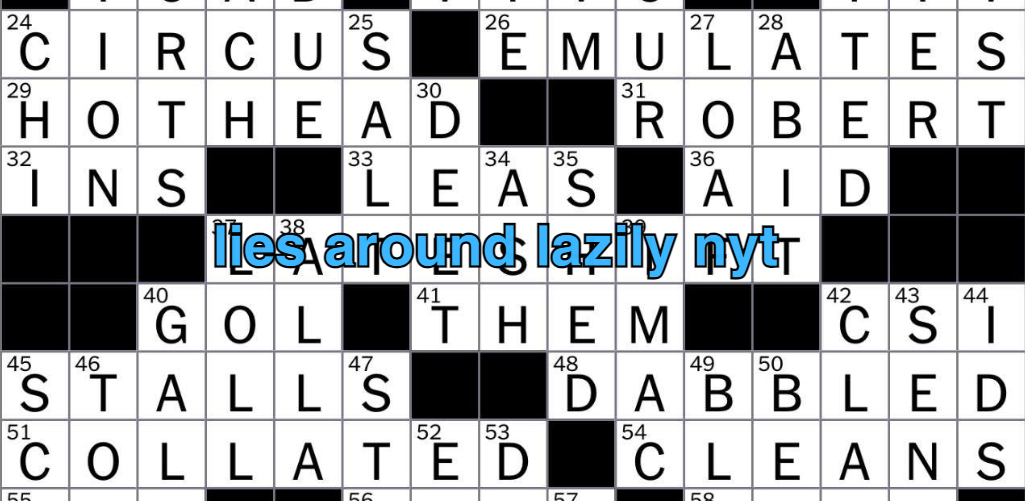Contents
Introduction
The phrase “lies around lazily NYT” may initially seem enigmatic, especially if you’re not familiar with its context. As a crossword clue, it presents a challenge that combines wordplay with a specific answer that fits a particular pattern. This article will dive deep into the significance of “lies around lazily” as it appears in the New York Times crossword puzzles, examining its meaning, how to approach solving it, and the broader impact of such clues on crossword enthusiasts.
Whether you’re a seasoned crossword solver or a casual player, this comprehensive guide aims to provide insights that surpass standard explanations, ensuring you have a thorough understanding of the topic.
Understanding Crossword Clues and Their Significance
The Nature of Crossword Puzzles
Crossword puzzles are a popular form of word game that test a player’s vocabulary, general knowledge, and problem-solving skills. They consist of a grid of squares, some of which are filled with letters to form words based on clues provided. These clues can be straightforward or involve complex wordplay, requiring solvers to think critically.
The Role of “Lies Around Lazily” in Crossword Puzzles
In the context of crossword puzzles, a clue like “lies around lazily” typically requires solvers to interpret the phrase creatively. Such clues often involve a play on words or a hidden meaning that aligns with a specific answer. For example, the clue might use synonyms, homophones, or anagrams to guide the solver to the correct answer.
Analyzing the Clue: “Lies Around Lazily NYT”
Breaking Down the Clue
The clue “lies around lazily” suggests a need for an interpretation that connects “lies” with the idea of being “lazy” or “unmotivated.” In crossword puzzles, such clues often play with words or phrases to lead to the correct answer. The clue might be hinting at a word or phrase that means “lying around” in a casual or relaxed manner.
Possible Solutions and Their Interpretations
For the clue “lies around lazily,” the answer is likely to be a term or phrase that embodies the idea of being idle or relaxed. In the context of American crosswords, the solution often fits the length and pattern of the available squares.
Common Answers for “Lies Around Lazily”
One possible answer that fits the clue is “LAYS ABOUT.” This answer aligns with the idea of lying around lazily and is a common phrase used in casual conversation. It implies a state of being idle or not engaging in any productive activity, which fits the clue’s description.
Contextualizing the Answer
The answer “LAYS ABOUT” can be interpreted as follows:
- LAYS: Refers to the act of lying down or resting.
- ABOUT: Suggests a state of being around or in the vicinity without a specific purpose or direction.
Together, “LAYS ABOUT” effectively captures the essence of lying around in a lazy manner, making it a fitting answer to the clue provided.
Strategies for Solving Similar Crossword Clues
Understanding Clue Types
To excel in crossword puzzles, it’s essential to understand different types of clues:
- Definition Clues: Directly define the answer.
- Cryptic Clues: Use wordplay, including anagrams, homophones, and other linguistic tricks.
- Charade Clues: Break the answer into parts or use synonyms.
- Rebus Clues: Use symbols or multiple letters to represent a single word.
Approaching Wordplay Clues
For clues like “lies around lazily,” which involve wordplay:
- Identify Key Terms: Focus on the significant words in the clue (“lies,” “around,” “lazily”).
- Consider Synonyms: Think of words or phrases related to these terms.
- Match the Pattern: Ensure the solution fits the crossword grid’s pattern and length.
Practice and Familiarity
Regular practice with different crossword puzzles can enhance your ability to solve complex clues. Familiarity with common crossword answers and wordplay techniques is crucial for quick and accurate solving.
The Impact of Crossword Puzzles on Cognitive Skills
Enhancing Vocabulary and General Knowledge
Crossword puzzles are known to improve vocabulary and expand general knowledge. Solvers are exposed to a wide range of topics, including history, science, literature, and more, which helps in building a diverse knowledge base.
Stimulating Mental Agility
Solving crosswords requires critical thinking and problem-solving skills. It stimulates mental agility by challenging solvers to make connections between clues and answers, improving cognitive function over time.
Providing Entertainment and Relaxation
For many, crossword puzzles are a source of relaxation and enjoyment. They offer a mental challenge that can be both stimulating and soothing, making them a popular pastime for people of all ages.
FAQs About “Lies Around Lazily NYT”
1. What does “lies around lazily” mean in crossword puzzles?
“Lies around lazily” is a crossword clue that typically refers to a phrase or word meaning to be idle or relaxed. The answer often captures the essence of lying around in a casual or lazy manner.
2. What is the likely answer for the clue “lies around lazily” in the NYT crossword?
The likely answer for the clue “lies around lazily” is “LAYS ABOUT.” This phrase fits the clue’s description of lying around in a lazy way.
3. How can I improve my skills in solving crossword clues?
To improve your crossword-solving skills, practice regularly, familiarize yourself with common crossword answers and wordplay techniques, and study different types of clues. Engaging with various puzzles can also enhance your problem-solving abilities.
4. Are there any specific strategies for tackling tricky crossword clues?
Yes, some strategies include breaking down the clue into key terms, considering synonyms or related words, matching the answer to the grid pattern, and using a process of elimination for unknown answers. Understanding the different types of clues and their common patterns can also be helpful.
5. How do crossword puzzles benefit cognitive health?
Crossword puzzles benefit cognitive health by enhancing vocabulary, stimulating mental agility, and improving problem-solving skills. They provide a mental challenge that can help keep the brain active and engaged, potentially reducing the risk of cognitive decline.
Conclusion
“Lies Around Lazily NYT” exemplifies the intriguing and often challenging nature of crossword puzzles. Understanding the clue and its potential answers requires a blend of creative thinking and familiarity with crossword conventions. By breaking down the clue, exploring possible answers, and employing effective solving strategies, crossword enthusiasts can navigate these puzzles with greater ease.
The answer “LAYS ABOUT” aptly fits the clue’s description and demonstrates the clever wordplay involved in crossword puzzles. As you continue to engage with crosswords, remember that practice and familiarity with various clue types will enhance your solving skills and deepen your appreciation for this classic word game.
Whether you’re a novice or an experienced solver, the insights provided in this article aim to enrich your understanding of crossword clues and their significance. Happy puzzling!




